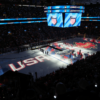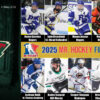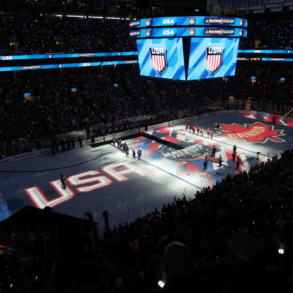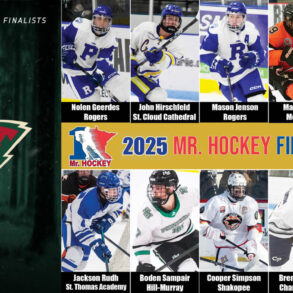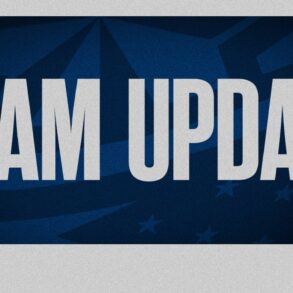Stop the presses: The National Hockey League had a really good idea.
During these soft few weeks in the North American sporting calendar, hockey has done what it almost never does and seized the mantle of the hottest story in sports. Across a week and a half, the league has staged the 4 Nations Face-Off, a best-on-best international tournament made up of NHL players from the United States, Canada, Sweden, and Finland. The countries played a round-robin, peaking with the Americans’ 3–1 win over the Canadians Saturday in Montreal. The chips have fallen into a rematch, and these two vicious rivals play in Boston Thursday night for all the marbles.
Nobody really watches national hockey telecasts anymore, but people are tuned into this thing, and why wouldn’t they be? The 4 Nations has been some of the most intense hockey anyone has watched in years, much closer to an Olympic gold medal game or Game 7 of the Stanley Cup Final than a typical set of NHL contests. The players have taken the tournament as seriously as a heart attack, throwing their fists and bodies around with abandon. The fans in the arenas (for four games in Montreal and two in Boston so far) have been rabid. This inaugural tournament could not possibly feel more big-time.
The 4 Nations is not the kind of breakthrough one expects to see emerge from the office of NHL Commissioner Gary Bettman, the sour personality who has led the league since 1993. Though he has had some notable wins, Bettman’s three decades in charge have been bleak on the whole, a collection of missed chances to serve hockey fans but seized opportunities to initiate lockouts. Bettman is not the sole reason that NHL players were not permitted to participate in the 2018 or 2022 Winter Olympics, an absence that robbed fans of an occasion to see great hockey and the NHL itself of the best possible advertisement for its sport and players. But he was a key mover and the public face of those omissions, and his generally spineless leadership of the sport does not make him sympathetic.
Here, though, Bettman’s NHL has a firecracker on its hands. The league has found its way to a nearly perfect concept that solves two problems at once. One, it creates, out of thin air, a compelling competition that has enraptured players and fans alike. Two, it spares everyone involved from going through the motions of a stale all-star game, a hell in which the NBA is now stuck. The National Hockey League as a model for other sports leagues to follow? Who’d have thunk it. The NHL has had a few winning ideas in its day—putting beloved expansion teams in places like Nashville and Las Vegas stands out—but the 4 Nations has a credible case as the best thing the league has ever created.
The beauty of this particular tournament owes in part to the NHL’s prior shortcomings. The league’s players started playing in the Olympics in 1998, and the Winter Games became the only reliable platform to host the best players in the world going at each other on behalf of their countries. (The annual Ice Hockey World Championships conflicts with the Stanley Cup Playoffs and draws a solid but by no means maxed-out collection of NHL players.) The NHL’s Olympic absences in 2014 and 2018 were a hockey travesty, and they left an unfillable void for fans. The league revitalized the old World Cup of Hockey in 2016, and that tournament was fun but not exactly Olympian. A key difference was that the best 23-and-under players from the United States and Canada combined on a mixed “North America” team.
Every good thing feels better after a long layoff. The 4 Nations has been the first best-on-best event without roster strings attached since the 2014 Games in Sochi, Russia. The field isn’t as varied as an Olympic tournament, starting with the omission of Russia, which boxed itself out of most international sports when Vladimir Putin invaded Ukraine. But the four best teams of the NHL’s Olympic era were the four in this tournament, and Russia’s absence will not put an asterisk on this event in most people’s minds.
The NHL’s long Olympics-less night has made this tournament more special because of the roster combinations it has created. The two leaders of the American team are Matthew and Brady Tkachuk, brothers (and the sons of an all-time American star, Keith) who had never played on the same team until this tournament. (I don’t mean just in international competition. They had never been teammates at all.) Canada had never put together the trio of Sidney Crosby, Connor McDavid, and Nathan MacKinnon. Crosby is the defining NHL player of this century, but McDavid and MacKinnon passed him as the league’s best forwards a few years ago. To watch the three of them combine for a nifty power play goal is to watch the fusion of eras. Crosby is polishing his résumé as the best international men’s player ever, and he’s doing it alongside the athletes who will eventually succeed him as Canada’s leaders.
The tournament has also drawn some juice from the rancid times in which we all live. The geopolitical subtext is just regular text now. Donald Trump has threatened tariffs on Canadian goods and has frequently mused about annexing the country. Canadian fans booed “The Star-Spangled Banner” in response. Matthew Tkachuk, who appears to like Trump a lot, said he “didn’t like” the booing, then began the U.S.–Canada game, after more booing, by immediately squaring up for a fight with Canada’s Brandon Hagel. Two more fights broke out in the game’s first nine seconds. American general manager Bill Guerin later explained the fights: “I think there was a little bit of a political flare to it. It’s just the time that we’re in. I think our guys used that as inspiration.” Unprompted, he told a Fox News interviewer that the team would really like for Trump to attend Thursday’s game. The president isn’t going, but he phoned into the locker room on Thursday morning. Guerin said Trump talked about annexation “a little bit” but reminded reporters, “This is not a political forum.” OK, then.
Is any of this the sign of a healthy body politic? No. Has it added some emotional charge to at least one side of international hockey’s biggest rivalry at the moment? Certainly. If the Canadians win in Boston on Thursday, will Crosby or McDavid depart from his usual public posture of saying only the most boring, anodyne things and use the occasion to make a “51st state” quip? Definitely not.
Not every international tournament will unfold against this backdrop or be this much fun, but the NHL has good reason to stick with a similar structure well into the future. The league’s all-star game is mediocre, much as the NBA’s is, because no amount of gimmicky format tweaks or celebrity captains can compensate for players who don’t care about the outcome of the game. The best players aren’t the best players when they aren’t motivated. At the 4 Nations, everyone is motivated. Crosby, who’s playing this tournament with an injury from his NHL season, clinched Canada’s previous game by hurling himself into a Finnish opponent at center ice before collecting the puck and firing it into an empty net. The Tkachuks, who are the key players on their NHL teams, put their skulls on the line in those early fights.
The NHL pros will return to the Olympics for the 2026 Games in Milan, and the league will proceed with its more standard World Cup of Hockey format running two years after that. So this specific tournament, with these specific teams, might never come around again. But it’s the spirit of the thing that matters and should inform executives in all sports.
What if the NBA ditched its all-star game in certain years and held a best-on-best international tournament over the course of a week? Major League Baseball might also take a lesson from the 4 Nations. The World Baseball Classic is an excellent event, but it suffers a bit from happening in March, right before the MLB season. Players aren’t fully ramped up yet, especially pitchers. Would the WBC get more of the best players playing at the peak of their powers if it arrived smack-dab in the middle of the season, as the 4 Nations has in hockey? These are concepts that leagues should ponder before tossing them out due to logistical challenges.
What is inarguable is that sports fans love it when the best players try to beat one another in international events. “Put the best players in the world against each other in a tournament in which hundreds of millions of people have a national rooting interest” is not a revolutionary idea, but it is a good one that a lot of sports executives have managed to botch in the past. With any luck, the legacy of this 4 Nations will be that the people in charge of international sports never repeat that particular mistake.
This post was originally published on this site be sure to check out more of their content.


